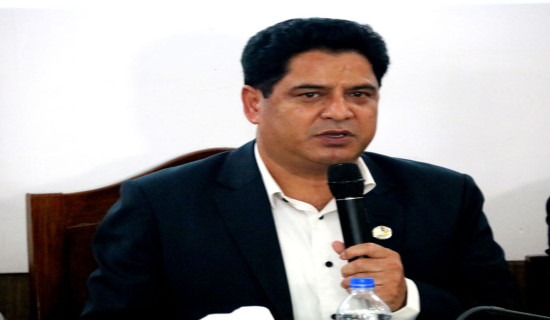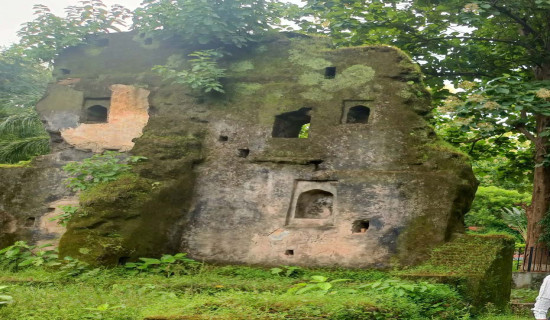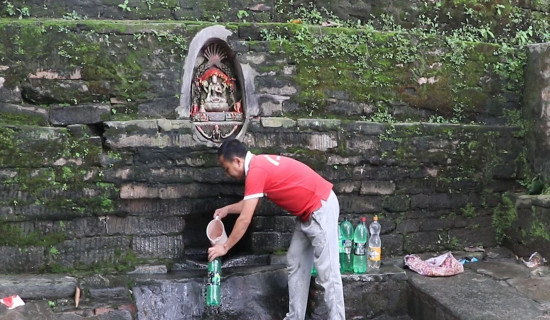- Friday, 29 August 2025
51 electric vehicle charging stations of NEA come into operation
By Laxman Kafle,Kathmandu, Sept. 7: Fifty-one electric vehicle charging stations constructed by Nepal Electricity Authority in various places across the country have come into operation.
Minister for Energy, Water Resources and Irrigation Shakti Bahadur Basnet and Secretary Dinesh Kumar Ghimire jointly inaugurated the fast charging station established at Nepal Police Club Bhrikutimandap in Kathmandu Wednesday.
With the investment of the Authority and concessional loans from the Asian Development Bank and the technical support of the Norwegian government, 51 charging stations that can charge electric vehicles have been built on the main highways, bus parks and big cities of seven provinces under the electric vehicle charging infrastructure development project.
Out of 51, six charging stations are operational in Kathmandu Valley. Two charging stations have been constructed at Dharke in Dhading, three in Chitwan and one each in Bhaktapur and Lalitpur.
Similarly, three charging stations have been constructed in Sindhuli, two each in Mahottari and Sarlahi and four in Jhapa district.
Out of the charging stations constructed at a cost of around Rs. 400 million, big buses, micros, trucks and cars can be charged in 26 charging stations and small and big cars can be charged in 25 charging centres.
The charging will cost an average of 70 paisa per km for cars, 80 paisa for SUVs, 90 paisa for microbuses and 120 paisa per kilometer for buses.
Depending on the battery capacity of the vehicles available in Nepal, the charge can be completed in at least half an hour to one hour, said the NEA.
The charging stations have been established to increase the domestic consumption of electricity, reduce the consumption of petroleum products and to reduce imports, and to develop an environment-friendly transportation system through the use of electric vehicles.
Each charging station has a 142-kilowatt capacity charger, a 50 kVA transformer for power supply, and an online charging system, said the NEA.
The DC chargers of 60-60 kilowatts and 22-kilowatt AC chargers are placed at the charging stations. With this, three vehicles including big buses can be charged simultaneously, it said.
A contract was signed with Wanbang Digital Energy Corporation Ltd., China with Rs. 377.9 million (excluding tax) for charging station construction, supply, installation, testing, operation and maintenance, said the NEA.
According to NEA, the maintenance of the charging station will be done by the contractor company for five years of its operation.
The software of the charging station will be kept in the Authority's data centre so that more than 300 chargers can be served.
All 51 stations will be controlled from Kathmandu. After charging the vehicle, the customer can pay the bill through the QR code and mobile app.
New journey in electric vehicles and sustainable development On the occasion, Minister Basnet said that operating 51 charging stations is an important step in the sustainable development of the country by reducing the effects of carbon emissions and climate change through green and clean energy consumption.
Stating that the government is working for the policy and legal arrangements for the promotion of electric vehicles, Basnet said that efforts are being made to attract investors to produce electric vehicles in Nepal.
Transport is an important sector that increases electricity consumption internally; Energy Secretary Ghimire said that the use of electric vehicles will help increase per capita energy consumption.
Managing Director of NEA Kul Man Ghising said that the charging station has been established to promote the use of electric vehicles.
Stating that electric vehicles are 15-20 times cheaper than those running on petroleum products, Ghising said that this will also contribute positively to the country's foreign exchange reserves and reduce mounting trade deficit. He mentioned that the Authority is going to establish additional 500 charging stations across the country.
Sujata Gupta, Chief of the South Asia Energy Division of the Asian Development Bank, emphasised on building infrastructure to encourage the use of electric vehicles as transportation is an important sector for reducing carbon emissions.








-square-thumb.jpg)
-original-thumb.jpg)







